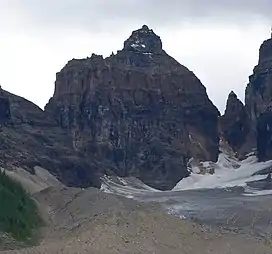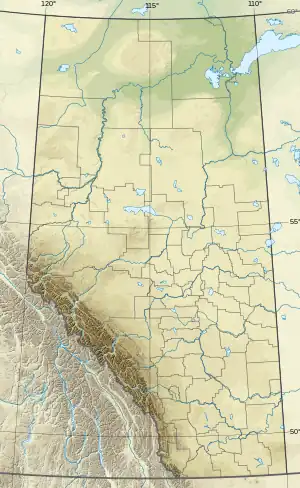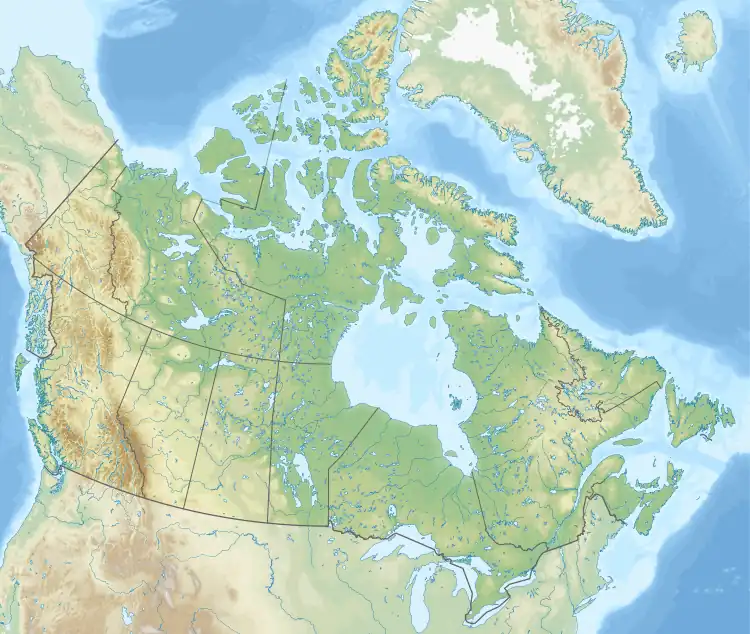The Mitre (Alberta)
The Mitre is a 2,850-metre (9,350-foot) mountain summit located in the Lake Louise area of Banff National Park, in the Canadian Rockies of Alberta, Canada. Its nearest higher peak is Mount Lefroy, 1.0 km (0.62 mi) to the west.[1] Mount Aberdeen is 2.0 km (1.2 mi) to the north-northeast, Lefroy Glacier immediately north, Mitre Glacier southwest, and Paradise Valley to the southeast.
| The Mitre | |
|---|---|
 The Mitre and Lefroy Glacier | |
| Highest point | |
| Elevation | 2,850 m (9,350 ft)[1] |
| Prominence | 229 m (751 ft)[1] |
| Parent peak | Mount Lefroy (3423 m)[1] |
| Listing | Mountains of Alberta |
| Coordinates | 51°21′48″N 116°15′44″W[2] |
| Geography | |
 The Mitre Location of The Mitre in Alberta  The Mitre The Mitre (Canada) | |
| Location | Alberta, Canada |
| Parent range | Bow Range |
| Topo map | NTS 82N8 Lake Louise |
| Geology | |
| Age of rock | Cambrian |
| Type of rock | Sedimentary rock |
| Climbing | |
| First ascent | 1901 C. Kaufmann; J. Pollinger; G. Collier; E. Tewes; G. Bohren[1] |
History
The Mitre was named in 1893 by Samuel E.S. Allen presumably because the mountain resembles a Bishop's mitre.[3][4]
The first ascent of the peak was made in 1901 by Christian Kaufmann, J. Pollinger, G. Collier, E. Tewes, and G. Bohren.[1]
The mountain's name was officially adopted in 1952 by the Geographical Names Board of Canada.[2]
Geology
Like other mountains in Banff Park, The Mitre is composed of sedimentary rock laid down during the Precambrian to Jurassic periods.[5] Formed in shallow seas, this sedimentary rock was pushed east and over the top of younger rock during the Laramide orogeny.[6]
Climate
Based on the Köppen climate classification, The Mitre is located in a subarctic climate zone with cold, snowy winters, and mild summers.[7] Temperatures can drop below −20 °C with wind chill factors below −30 °C.
References
- "The Mitre". Bivouac.com. Retrieved 2019-02-07.
- "The Mitre". Geographical Names Data Base. Natural Resources Canada. Retrieved 2019-02-07.
- Place-names of Alberta. Ottawa: Geographic Board of Canada. 1928. p. 88.
- "The Mitre". cdnrockiesdatabases.ca. Retrieved 2019-02-07.
- Belyea, Helen R. (1960). The Story of the Mountains in Banff National Park (PDF). parkscanadahistory.com (Report). Ottawa: Geological Survey of Canada. Archived (PDF) from the original on 2015-10-02. Retrieved 2019-09-13.
- Gadd, Ben (2008). Geology of the Rocky Mountains and Columbias.
- Peel, M. C.; Finlayson, B. L.; McMahon, T. A. (2007). "Updated world map of the Köppen−Geiger climate classification". Hydrol. Earth Syst. Sci. 11: 1633–1644. ISSN 1027-5606.
See also
External links
- Parks Canada web site: Banff National Park
- The Metre weather: Mountain Forecast